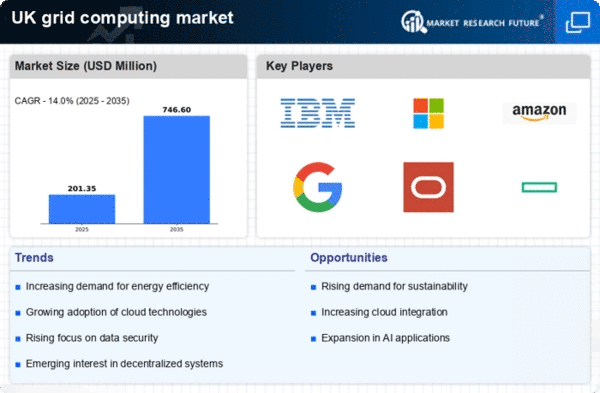Government Initiatives and Funding
Government initiatives play a crucial role in shaping the grid computing market in the UK. Various funding programs and policies aimed at promoting technological innovation are being implemented to bolster the adoption of grid computing solutions. For instance, the UK government has allocated substantial resources to support research and development in advanced computing technologies, which includes grid computing. This financial backing not only encourages public sector organizations to adopt grid solutions but also stimulates private sector investment. Collaboration between academia and industry is being enhanced, leading to innovative applications of grid computing. As a result, the grid computing market is likely to benefit from increased funding and support, fostering a conducive environment for growth and development.
Emergence of IoT and Smart Technologies
The emergence of Internet of Things (IoT) and smart technologies is significantly impacting the grid computing market. As more devices become interconnected, the need for robust computing infrastructure to process and analyze the data generated by these devices is becoming increasingly apparent. In the UK, the IoT market is expected to grow substantially, with estimates suggesting it could reach £30 billion by 2025. This growth presents an opportunity for grid computing solutions to provide the necessary computational power and scalability to handle the influx of data from IoT devices. Consequently, the grid computing market is likely to evolve to meet the demands of smart technologies, enabling real-time data processing and analytics that are essential for effective decision-making.
Increased Focus on Collaborative Research
The grid computing market is benefiting from an increased focus on collaborative research initiatives across various sectors. In the UK, academic institutions and research organizations are increasingly leveraging grid computing to facilitate collaborative projects that require significant computational resources. This trend is evident in fields such as climate modeling, genomics, and materials science, where large datasets and complex simulations are common. The ability to share resources and expertise through grid computing enhances the efficiency and effectiveness of research efforts. As funding for collaborative research continues to grow, the grid computing market is likely to see an uptick in demand for solutions that support these initiatives, fostering innovation and advancing scientific discovery.
Growing Need for Data Management Solutions
The grid computing market is witnessing a growing need for effective data management solutions as organizations grapple with the exponential growth of data. In the UK, businesses are increasingly recognizing the importance of managing vast amounts of information efficiently. This trend is reflected in the rising investments in data analytics and storage solutions, which are projected to reach £5 billion by 2026. Grid computing offers a viable solution by enabling distributed data processing and storage, thereby enhancing data accessibility and reliability. As organizations strive to derive actionable insights from their data, the grid computing market is likely to see heightened demand for solutions that facilitate seamless data management and integration across various platforms.
Rising Demand for High-Performance Computing
The grid computing market is experiencing a notable surge in demand for high-performance computing (HPC) solutions. This trend is driven by the increasing need for complex data analysis and simulations across various sectors, including finance, healthcare, and scientific research. In the UK, the HPC market is projected to grow at a CAGR of approximately 8.5% from 2025 to 2030, indicating a robust appetite for advanced computational capabilities. As organizations seek to leverage big data and artificial intelligence, the grid computing market is positioned to provide the necessary infrastructure to support these initiatives. The ability to harness distributed computing resources effectively allows businesses to enhance their operational efficiency and reduce time-to-insight, thereby driving further investment in grid computing technologies.
















